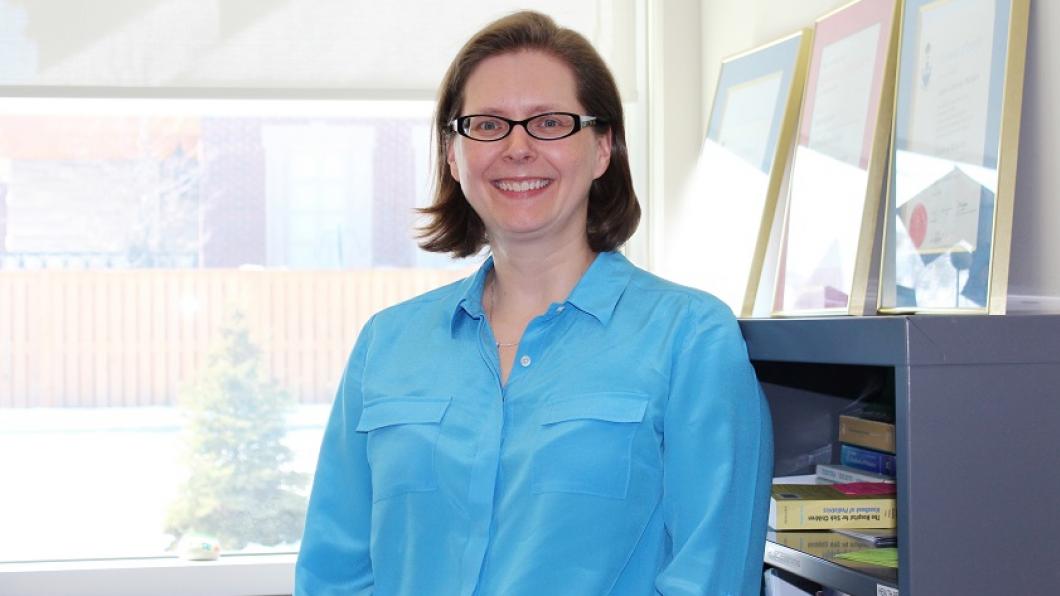
Physician passionate about her work around bullying research and children with disabilities
Consider this sobering statistic: 1 in 3 kids in Canada are bullied for how they look, how they talk, or some other reason. But what about children with disabilities, in particular, kids and youth who have muscular dystrophy?
That is what Dr. Laura McAdam intends to find out.
The physician is a clinician investigator at Holland Bloorview’s Bloorview Research Institute. For the past 14 years, she also has been running Ontario’s largest neuromuscular clinic at Holland Bloorview. She sees some 250 children and youth with these rare muscle disorders, some travelling from as far as Sudbury and Timmins – and many of them who have reported being bullied at school or other places.
A large, interdisciplinary team of nursing, therapists, a social worker, a youth facilitator and life-skills coach work closely with the families on issues surrounding the child’s disability as well as bullying experienced by the clients themselves. In addition, a parent advisor works with the research team to provide their lived experience knowledge to help inform the clinical research.
“We know as physicians who see children with physical disabilities, they are at higher risk of being bullied. Because this this has not been studied before, I’m quite passionate about this and feel it’s important to understand the potential impact bullying has on children with muscular dystrophy and other congenital myopathies.”
Muscular dystrophy and congenital myopathies are rare types of disorders that result in the deterioration of the muscles in the body over time. Some are born with muscle weakness, while others develop this condition as they grow older. These disorders rob a person of their muscle strength, making it hard to do things many take for granted, like walking, or simply brushing your teeth.
Because these children’s muscles are weaker, it means they may need to use a brace, walker or wheelchair to help them walk or run. “Their muscles may feel stronger at the beginning of the day so they can participate in recess and walk more, but by the end of the day, their muscles are fatigued so they cannot do the same activities,” explains Dr. McAdam. “I worry because perhaps bullying is centred on their ability to move, and other people may not understand that these kids’ muscles feel different at different times of the day.”
Dr. McAdam recounts one particular story where a client of hers was being victimized at school. This youth was constantly “being pushed down by bullies and not able to get up independently.” With the parents’ and child’s permission, she contacted the principal to report these troubling incidents.
“As healthcare professionals, when you hear this information, it is our role to step in advocate provided we have permission.”
She also add that teachers and principals have many other things to attend to, so they may not see what is happening in the hallways and playgrounds. She feels that it’s her duty to bring these issues to their attention and raise their awareness so they are more attuned to what is happening in the school environment.
To understand what these youth are experiencing, and to develop strategies to prevent them from being bullied, Dr. McAdam is current recruiting 75 youth with muscular dystrophy or congenital myopathies and their parents/caregivers from her clinic as well as from the Ottawa-based Children’s Hospital of Eastern Ontario to participate in a study. The youth will be asked to fill out an online survey that will ask them questions about their experiences of being bullied. If the youth provides consent, their parents or caregivers will also be given a short online survey to fill out.
The recruitment period for the survey will end in June 30, 2021. If you are interested in more details about the study, please contact Christina Ippolito, research coordinator, at cippolito@hollandbloorview.ca
The study, Assessing the Frequency and Experience of Bullying or Peer Victimization in Children with Muscular Dystrophy and Congenital Myopathies, is funded by AHSC AFP Innovation Fund.
If you are a Holland Bloorview client or family member, and would like to find out more about other studies being conducted at the Bloorview Research Institute, visit Connect2Research to connect to new research opportunities.